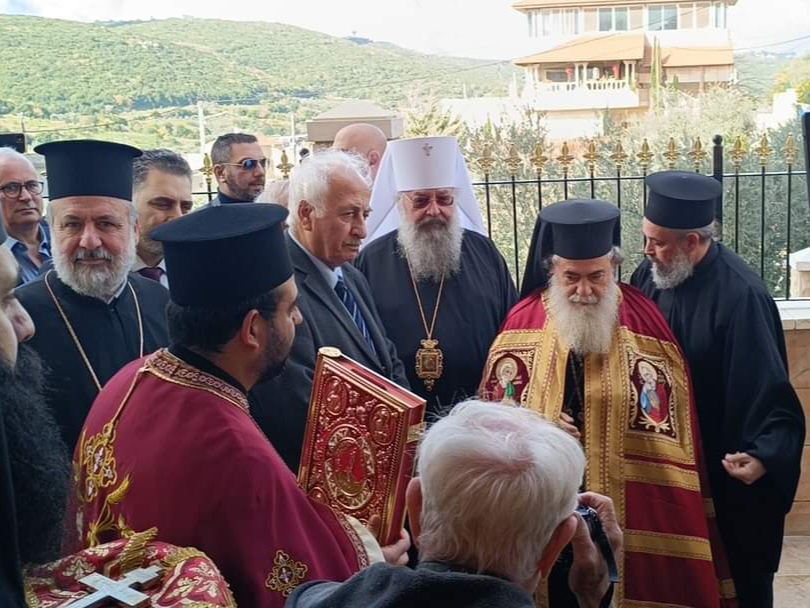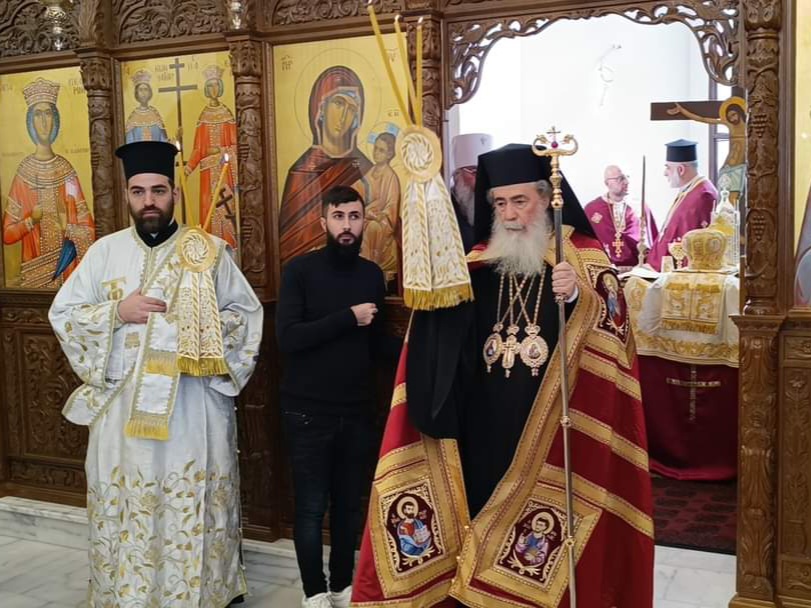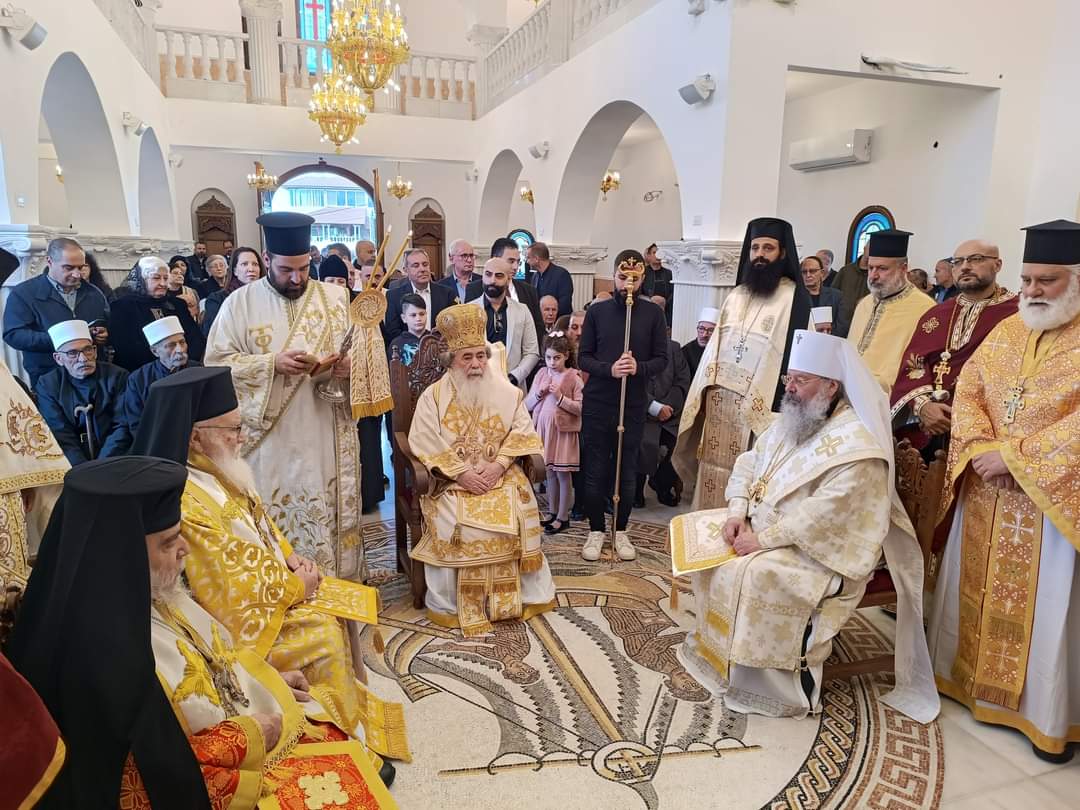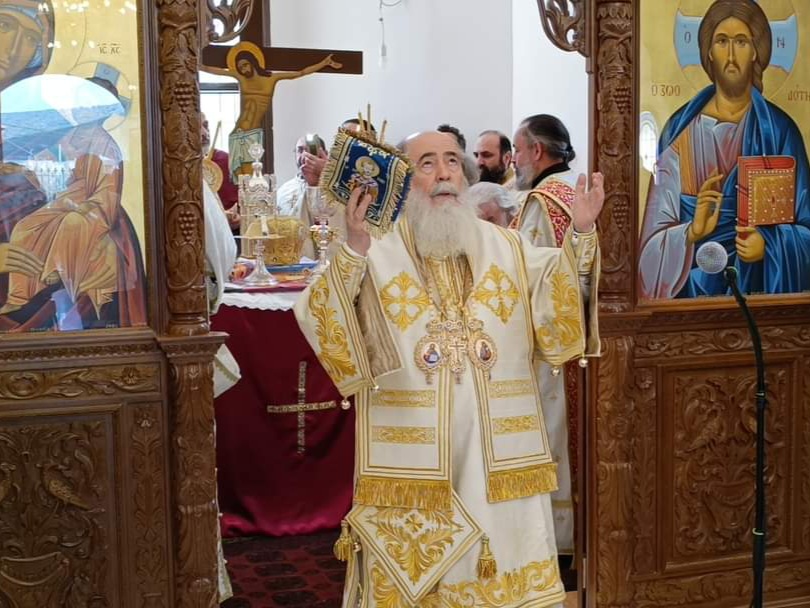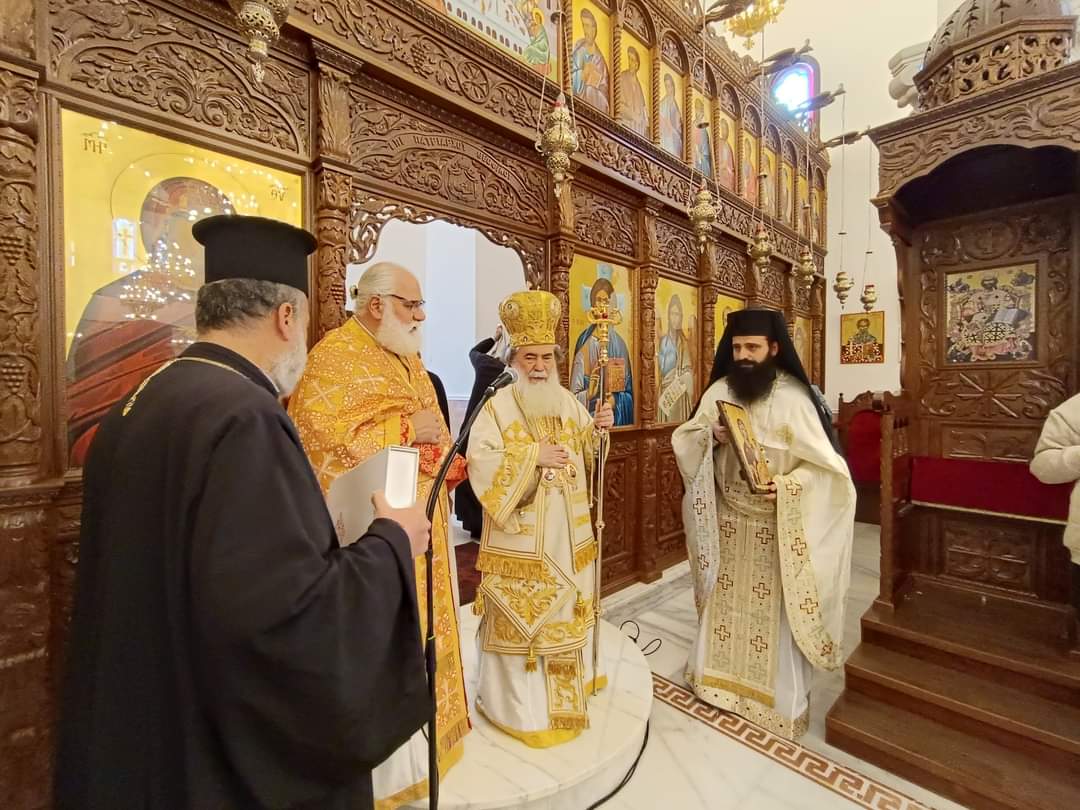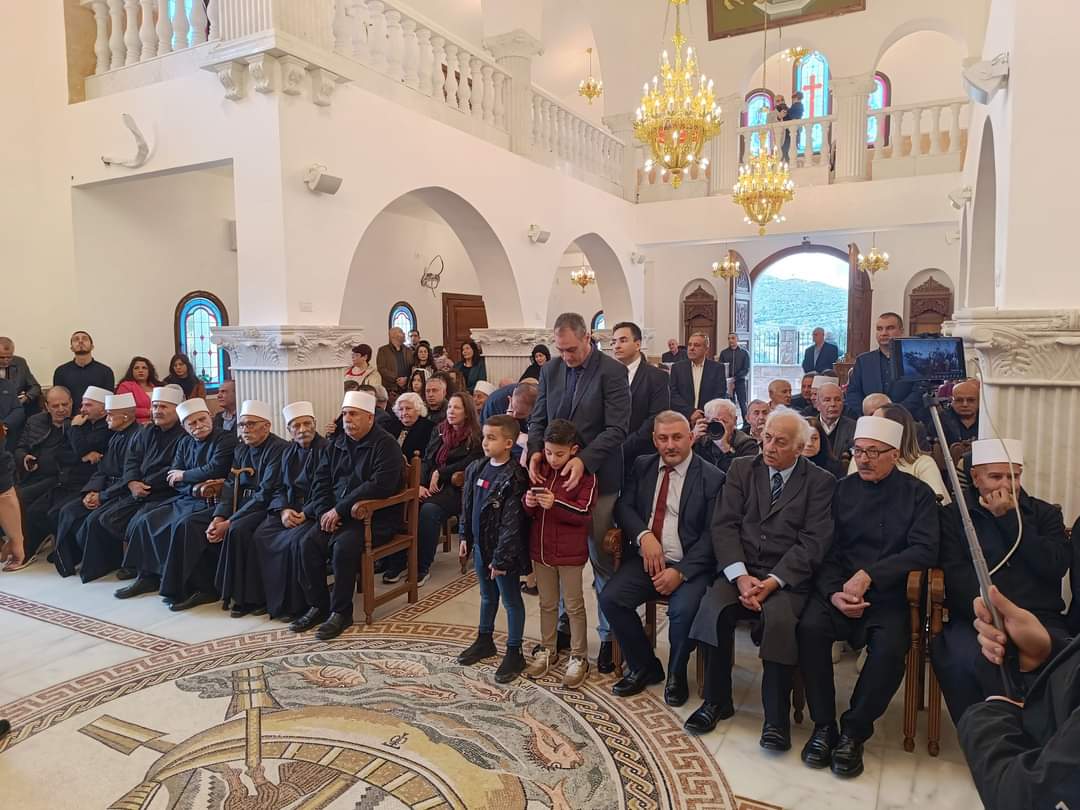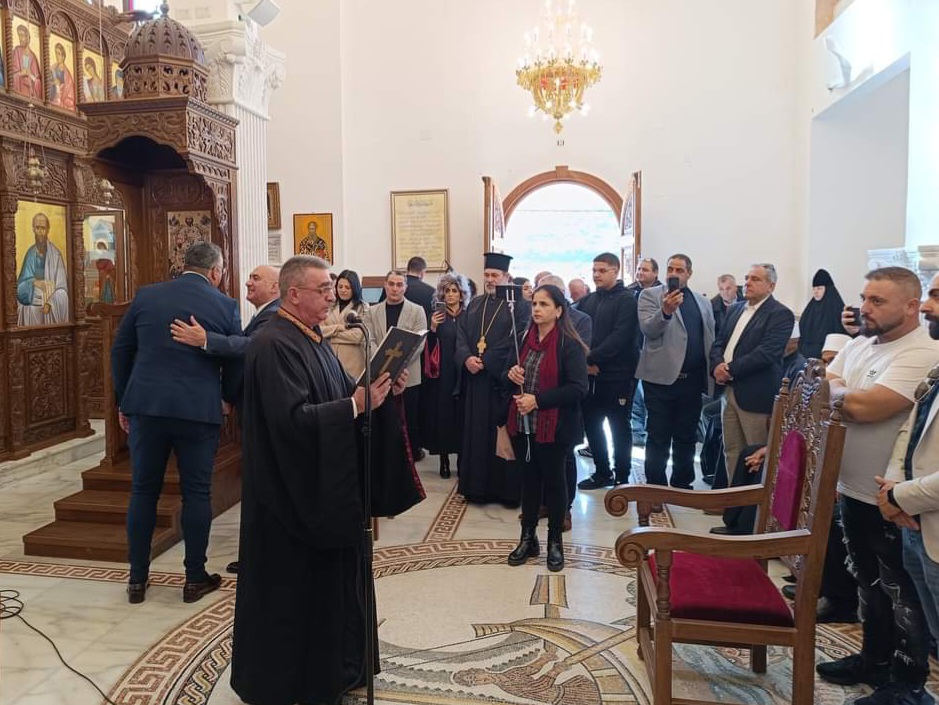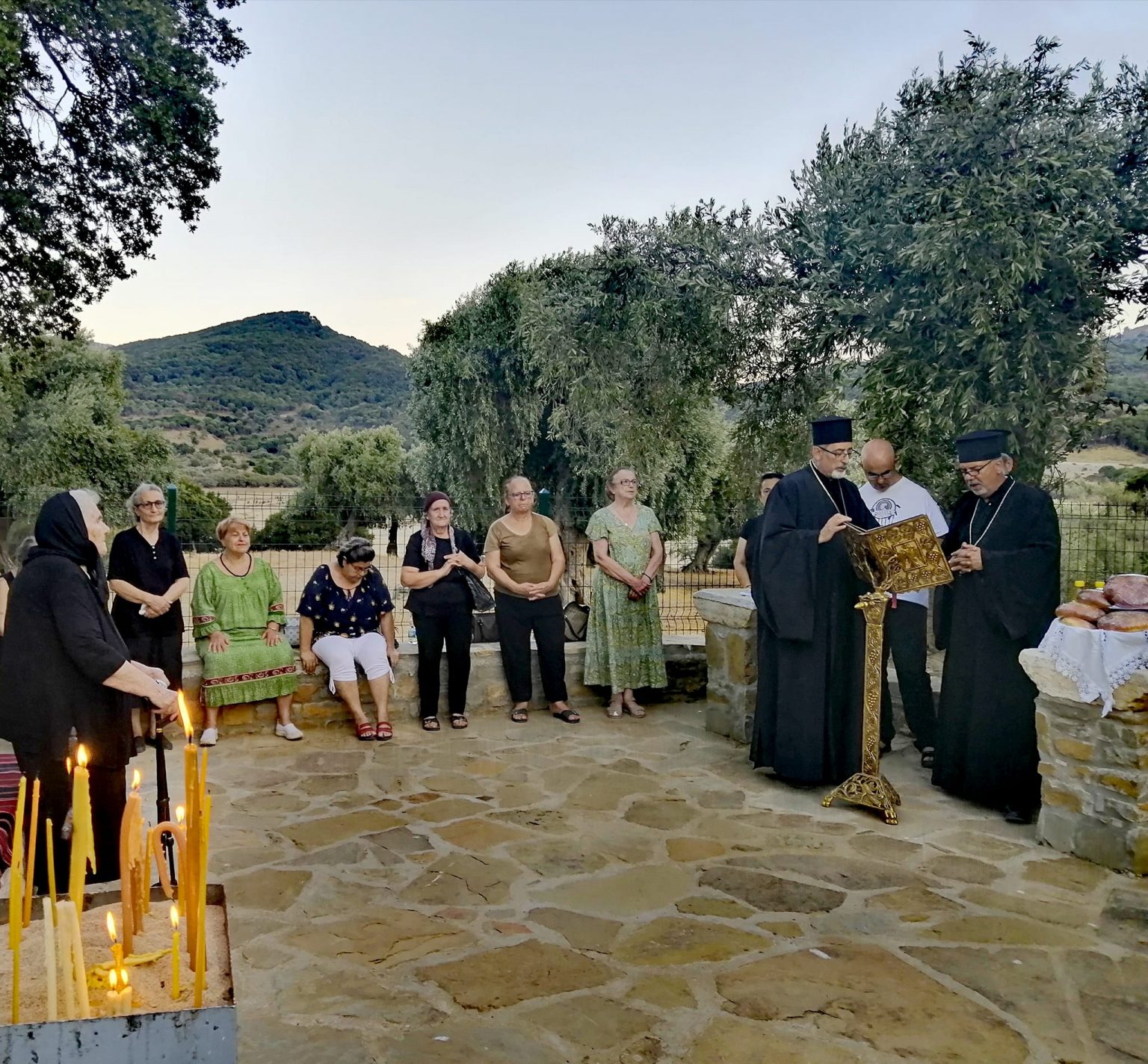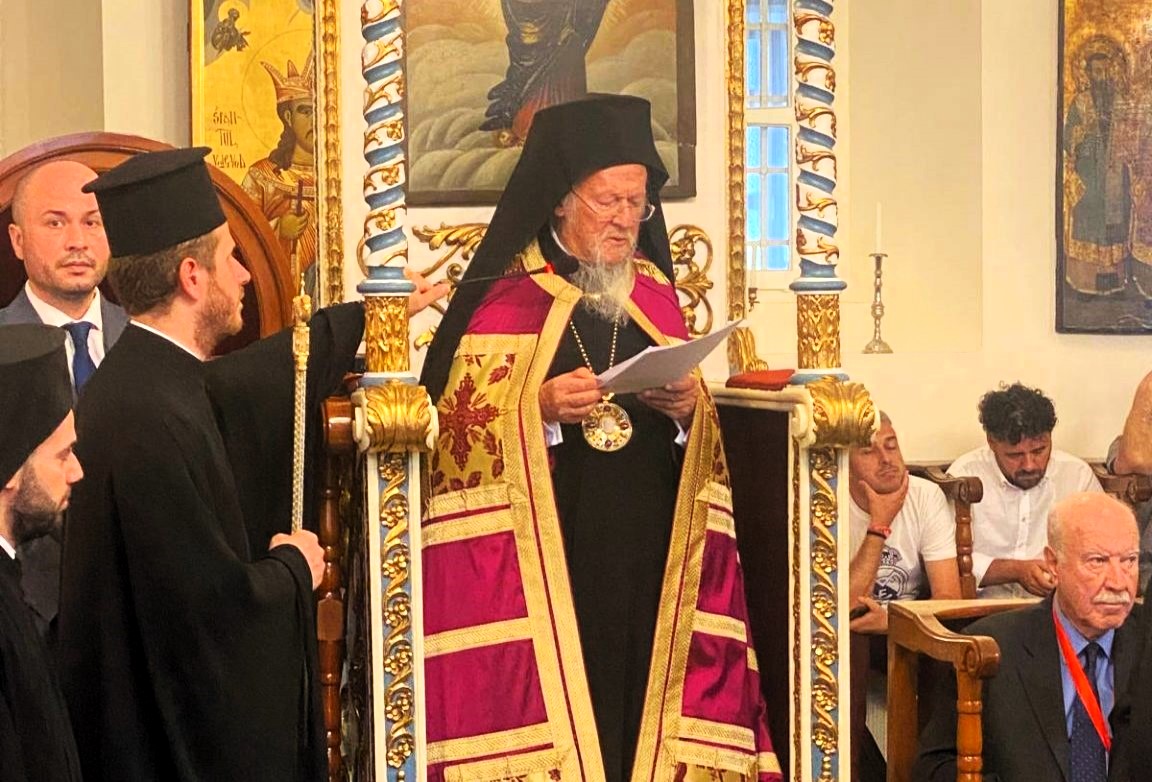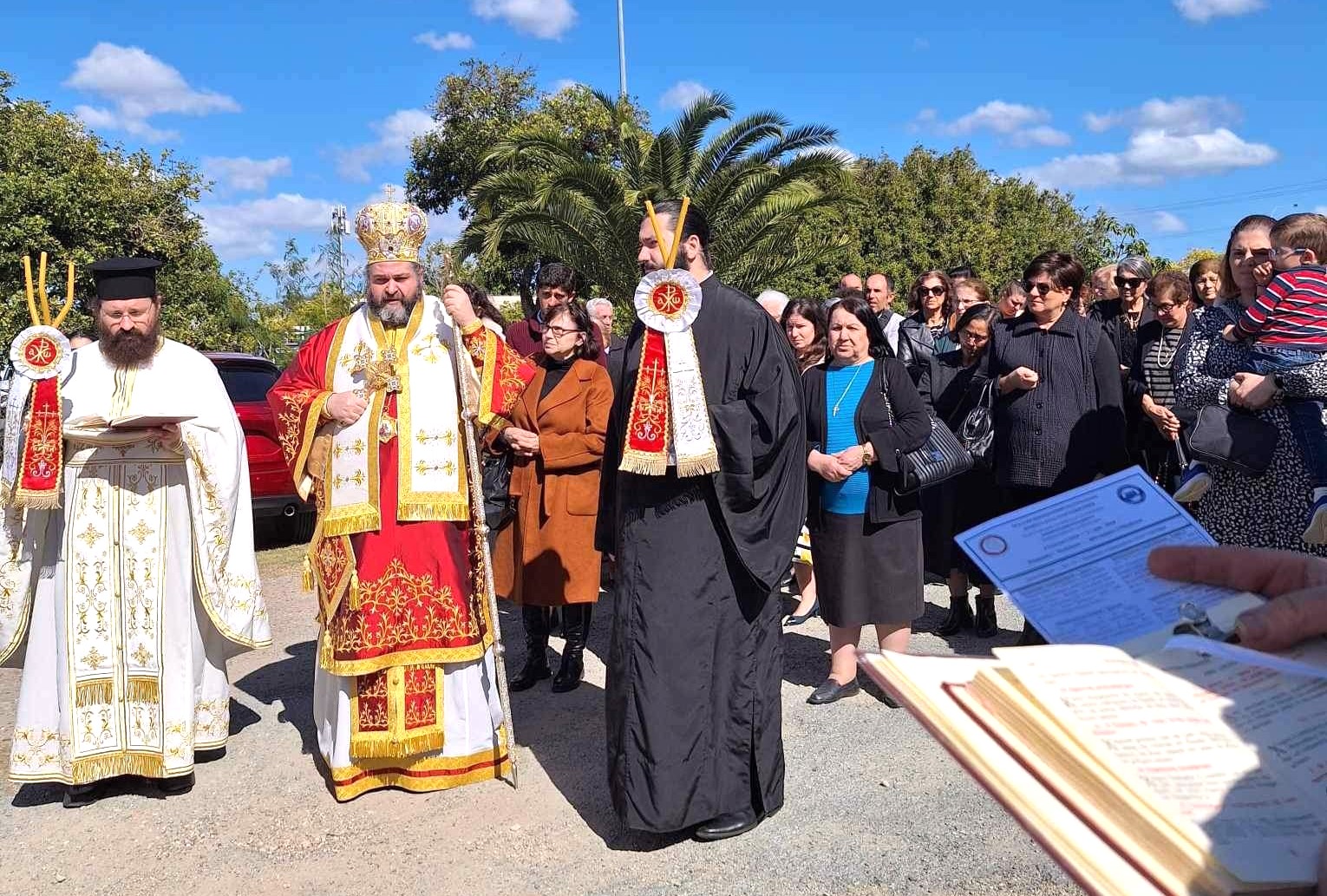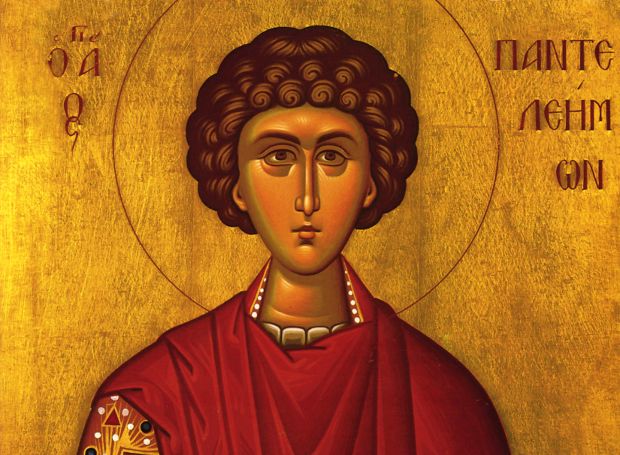The Patriarch of the Holy City presided over the Divine Liturgy in the village of Kufr Sumei
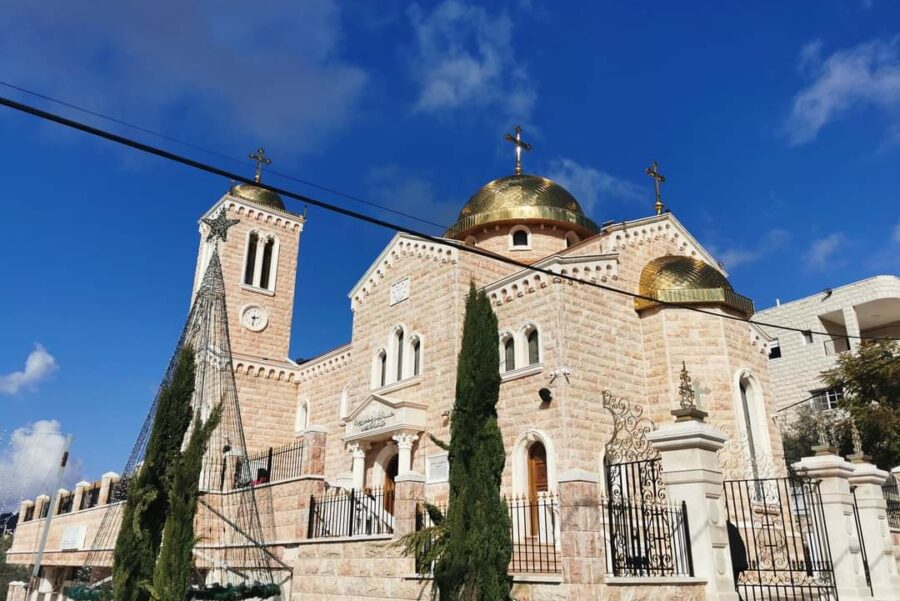

Kufr Sumei, Western Galilee
The Holy Land
February 10, 2024
His Beatitude Patriarch Theophilos III, Patriarch of the Holy City of Jerusalem, presided over a divine liturgy at the newly inaugurated Church of Saints Constantine and Helena in the village of Kufr Sumei, on Saturday morning, 10 February 2024.
His Beatitude was accompanied by His Eminence Metropolitan Kyriakos of Nazareth, and His Eminence Archbishop Aristarchos of Constantina as they were warmly welcomed by the local community of the village, including a large number of sheikhs of the well-known sect. Head of the Kufr Sumei local council, Mr. Yasser Ghadhban and members of the council welcomed the Patriarchal envoy along with the heads and members of the local pastoral councils of the Diocese of Akko. The Greek Consul in Haifa, Mr. Kostas Zenovius, and His Excellency the Consul of the Russian Federation, Mr. Dr. Amin Safiya, were among the attendees of the liturgy with a large gathering of local Christians from the cities and villages of Galilee.
Following the Divine Liturgy, His Beatitude gave a speech highlighting the necessity of preserving the cohesion between brothers of the same family, that is the church, the warm and safe home that brings together believers and unites them on the rock of love and harmony, stressing the preservation of the good social fabric in the village of Kufr Sumei.
Later at the church hall, The patriarchal representative in the city of Acre, Archimandrite Silwanos Hanouneh, opened his speech by welcoming His Beatitude and Their Eminences to the village of Kufr Sumei, congratulating the parish and expressing his satisfaction with this reconciliation that took place today after many decades. He then presented the head of the local council of Kufr Sumei, who delivered a moving speech expressing his joy at this event, singing the words of Jesus Christ about love and unity, “That they all may be one, as You, Father, are in Me, and I in You; that they also may be one in Us, that the world may believe that You sent Me.” (John 17:21).
Then Mr. Bassam Nasser also welcomed, with ultimate joy, the honorable delegation and the attendance, congratulating the parish on this achievement that they had long awaited, thanking everyone who sought and worked to make this day happen. Later, Mr. Youssef Nasser, continued, citing the words of Jesus Christ about harmony and unity, which brought together the joyful celebration with the blessing of His Beatitude and the tireless efforts he made to reach this blessed moment. Mr. Youssef Nasser and his sons played a major role in supervising the construction of the church.
Soon after the speeches, everyone was invited to a meal offered by the parish in honour of His Beatitude and the accompanying delegation. Warmth and joy filled the room, depicting thus the true symbol of the good parishioners who followed the words of the Lord, praise be to Him: “Therefore, if you are offering your gift at the altar and there remember that your brother or sister has something against you, leave your gift there in front of the altar. First, go and be reconciled to them; then come and offer your gift.” (Matthew 5:23).
His Beatitude’s Sermon before Holy Communion follows below:
“Behold, how good and how pleasant it is for brethren to dwell together in unity!” (Psalm 133,1), the psalmist proclaims.
Beloved Brethren in Christ,
Reverend Christians,
The grace and peace of God has gathered us all in your beautiful town of Kufr Smea to celebrate the Holy Eucharist and thus declare in the common Chalice of the sacred body and blood of our Saviour Christ our ecclesiastical communion and unity.
We do this according to the fatherly advice of Saint Paul to the Ephesians: “I therefore, the prisoner of the Lord, beseech you that ye walk worthy of the vocation wherewith ye are called, with all lowliness and meekness, with longsuffering, forbearing one another in love; Endeavouring to keep the unity of the Spirit in the bond of peace. There is one body, and one Spirit, even as ye are called in one hope of your calling” (Eph. 4,1-4).
Stressing the idea of unity, Saint Paul says that God the Father “gave him [Christ] to be the head over all things to the church, which is his body, the fulness of him that filleth all in all” (Eph. 1,22-23). “Ye are the body of Christ, and members in particular” (1 Cor. 12,27), “For by one Spirit are we all baptized into one body, whether we be Jews or Gentiles, whether we be bond or free; and have been all made to drink into one Spirit” (1 Cor. 12,13) he writes to the Corinthians.
Moreover, realizing the danger and the unexpected malice of division, the wise Paul urges the Corinthians again in fervent love: “Now I beseech you, brethren, by the name of our Lord Jesus Christ, that ye all speak the same thing, and that there be no divisions among you; but that ye be perfectly joined together in the same mind and in the same judgment” (1 Cor. 1,10).
Indeed, my brethren, the schisms and the hatred tear apart the Church in various places, which is our Christian community, resulting in competing groups that contradict the fact that the Church is the body of Christ. Moreover, the schisms and the divisions oppose the mission of the Church in the world. And the mission of the Church is no other than the witness of Christ’s love. According to Saint John the Evangelist, the quarrels and divisions tarnish the testimony of the Church for Christ, since Christians are recognized as disciples of Christ by their mutual love. “By this shall all men know that ye are my disciples if ye have love one to another” (John 13,35).
According to Saint Paul, the division is the body of Christ, the Church, reveals the works of the flesh, which feed sin (c.f. Gal. 5,19). On the contrary, the unity in Christ of those who believe in Him is the fruit of the Holy Spirit. “But the fruit of the Spirit is love, joy, peace, longsuffering, gentleness, goodness, faith, meekness, temperance: against such there is no law” (Gal. 5,22-23).
“Behold, how good and how pleasant it is for brethren to dwell together in unity!” (Psalm 133,1), the psalmist says. Yes, my dear brothers and sisters, the One, Holy, Catholic and Apostolic Church in general, and the Church of Jerusalem in particular are the dwelling place of God. “Rejoice, Holy Zion, Mother of the Churches, dwelling place of God”, Saint John of Damascus proclaims.
And the Church is the dwelling place of God because the “great mystery of reverence” was given to it. Moreover, in the Church and through the Church we receive “the fruit of the Holy Spirit” (Gal. 5,22). For this, the blessed Paul says in his letter to Timothy: “These things write I unto thee, hoping to come unto thee shortly: But if I tarry long, that thou mayest know how thou oughtest to behave thyself in the house of God, which is the church of the living God, the pillar and ground of the truth” (1 Tim. 3,14-15). And in detail, I write these to you to let you know how one should live and behave in the house and family of God, that is, the Church of God, Who is a living God. And the Church is another pillar and strong foundation, which upholds the truth.
This “house of God” is also the Rum Orthodox Patriarchate of Jerusalem, and dwellers in it are the pious members of its Christian flock, who live in the Holy Land.
In other words, the Patriarchate has proven to be the feeding mother, who, as the Scripture says, found its people in a desert land, and in the waste-howling wilderness; it led them about, instructed them, it kept them as the apple of its eye (c.f. Deuteronomy 32,10). And the chief and finisher of our faith is Jesus Christ (c.f. Hebrews 12,2), Who says, “And him that cometh to me I will in no wise cast out” (John 6,37).
For this reason, we have been gathered and called upon today, all of us, in your respected community, my dear brothers and sisters, to declare Christ’s love to one another, and the unity of “a good profession before many witnesses” (1 Tim. 6,12), namely, the unity of faith and the communion of the Holy Spirit.
The God-inspired advice of Saint Paul also calls us to the same cause: “But now ye also put off all these; anger, wrath, malice, blasphemy, filthy communication out of your mouth. Lie not one to another, seeing that ye have put off the old man with his deeds; And have put on the new man, which is renewed in knowledge after the image of him that created him” (Col. 3,8-10). In other words, the ultimate goal of the one who puts on the new renewed man is to progress in the perfect knowledge of God, Who is the redeeming truth. “To this end was I born, and for this cause came I into the world, that I should bear witness unto the truth” (John 18,37), “And ye shall know the truth, and the truth shall make you free” (John 8,32), the Lord says.
How, therefore, my brethren, can we be free, when we carry in our hearts only hatred and malice against our fellow citizens, especially against our brothers and sisters in Christ? For this reason, Christ urges us: “And when ye stand praying, forgive, if ye have ought against any: that your Father also which is in heaven may forgive you your trespasses” (Mark 11,25).
Indeed, today’s liturgical gathering of clergy and laity and the members of this community is a sacred work of action. Because, as Saint Paul preaches, “For he that in these things serveth Christ is acceptable to God, and approved of men. Let us, therefore, follow after the things which make for peace, and things wherewith one may edify another” (Romans 14,18-19).
In conclusion, we would like to thank those who strove in zeal for the construction of this marvellous Church, Mr Yusef Nasser and his sons, and all those who contributed to its beautification, either morally or materially. Amen. Many peaceful returns!”
His Beatitude’s address at the meal follows below:
“Be ye doers of the word, and not hearers only, deceiving your own selves” (James 1,22), Saint James the Brother of God asks.
Reverend Holy Fathers and brothers in Christ,
Respected members of our community in Kufr Smea
We rend glory and thanksgiving to the Holy Triune God on this blessed gathering of clergy and people today in your multi-cultural town.
The purpose of the Holy Eucharistic gathering which we celebrated in the Holy and bloodless Altar, has been and is still the application of the Lord’s words: “A new commandment I give unto you, That ye love one another; as I have loved you, that ye also love one another” (John 13,34). And, “Peace I leave with you, my peace I give unto you: not as the world giveth, give I unto you. Let not your heart be troubled, neither let it be afraid” (John 14,27).
The lack and absence of love and peace in God and in the world are the main reasons for divisions, quarrels (Gal. 5,20) and wars (James, 4,1).
The mission of the Church in the world, which is the body of Christ, is no other than the evangelism of Christ’s commandments about love and peace, which [commandments] are the prerequisites of unity in the Holy Spirit. “There is nothing that angers God more than the division of the Church. A holy man said: not even a martyr’s blood can erase such a sin”, Saint Chrysostom says.
While we participate in the great sacrament of the Holy Eucharist, we participate in Christ’s Resurrection, therefore, we are called to declare this joyful event along with the hymnographer, proclaiming: “It is the day of Resurrection; let us be radiant for the festival, and let us embrace one another. Let us say, O brethren, even to those that hate us: Let us forgive all things on the Resurrection; and thus let us cry: Christ is risen from the dead, by death hath He trampled down death, and on those in the graves hath He bestowed life” (Pentecostarion, Sunday of Pascha, Stichera, Glory). Amen. Many peaceful returns!”
Source: Patriarchate of Jerusalem
